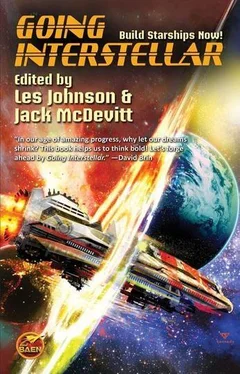He thought he knew.
He took the plots of each probe’s course and overlaid them against the map he’d been making of the fine structure of the interstellar medium. Sure enough, he saw that the probes had encountered a region where the interstellar gas thinned so badly that a ship’s power output declined seriously. There wasn’t enough hydrogen in that region for the fusion generator to run at full power! It was like a bubble in the interstellar gas: a region that was close to empty of hydrogen atoms.
Ignatiev retraced the flight paths of all six of the probes. Yes, the first one plunged straight into the bubble and shut itself down when the power output from the fusion generator dropped so low it could no longer maintain the ship’s systems. The next two skirted the edges of the bubble and experienced partial power failures. That region had been dangerous for the probes. It could be fatal for Sagan’s human cargo.
He started to write out a report for mission control, then realized before he was halfway finished with the first page that it would take more than six years for his warning to reach Earth, and another six for the mission controllers’ recommendation to get back to him. And who knew how long it would take for those Earthside dunderheads to come to a decision?
“We could all be dead by then,” Ignatiev muttered to himself.
“Your speculations are interesting,” said the AI avatar.
Ignatiev frowned at the image on the screen above his fireplace. “It’s not speculation,” he growled. “It is a conclusion based on observed data.”
“Alexander Alexandrovich,” said the sweetly smiling face, “your conclusion comes not from the observations, but from your interpretation of the observations.”
“Three of the probes had power failures.”
“Temporary failures that were corrected. And three other probes experienced no failure.”
“Those last three didn’t go through the bubble,” he said.
“They all flew the same trajectory, did they not?”
“Not exactly.”
“Within a four percent deviation,” the avatar said, unperturbed.
“But they flew at different times,” Ignatiev pointed out. “The bubble was flowing across their flight paths. The first probe plunged into the heart of it and shut down entirely. For four months! The next two skirted its edges and still suffered power failures.”
“Temporarily,” said the avatar’s image, still smiling patiently. “And the final three probes? They didn’t encounter any problems at all, did they?”
“No,” Ignatiev admitted grudgingly. “The bubble must have flowed past by the time they reached the area.”
“So there should be no problem for us,” the avatar said.
“You think not?” he responded. “Then why are we beginning to suffer a power shortage?”
“The inflowing hydrogen is slightly thinner here than it has been,” said the avatar.
Ignatiev shook his head. “It’s going to get worse. We’re heading into another bubble. I’m sure of it.”
The AI system said nothing.
Be sure you’re right , then go ahead. Ignatiev had heard that motto many long years ago, when he’d been a child watching adventure tales.
He spent an intense three weeks mapping the interstellar hydrogen directly ahead of the ship’s position. His worst fears were confirmed. Sagan was entering a sizeable bubble where the gas density thinned out to practically nothing: fewer than a dozen hydrogen atoms per cubic meter.
He checked the specifications of the ship fusion generator and confirmed that its requirement for incoming hydrogen was far higher than the bubble could provide.
Within a few days we’ll start to experience serious power outages, he realized.
What to do?
Despite his disdain for his younger crewmates, despite his loathing of meetings and committees and the kind of groupthink that passed for decision-making, he called a special meeting of the crew.
“All the ship’s systems will shut down?” cried one of the psychotechs. “All of them?”
“What will happen to us during the shutdown?” asked a biologist, her voice trembling.
Calmly, his hands clasped on the conference tabletop, Ignatiev said, “If my measurements of the bubble are accurate—”
“If?” Gregorian snapped. “You mean you’re not sure?”
“Not one hundred percent, no.”
“Then why are you telling us this? Why have you called this meeting? To frighten us?”
“Well, he’s certainly frightened me!” said one of the engineers.
Trying to hold on to his temper, Ignatiev replied, “My measurements are good enough to convince me that we face a serious problem. Very serious. Power output is already declining, and will go down more over the next few days.”
“How much more?” asked the female biologist.
Ignatiev hesitated, then decided to give them the worst. “All the ship’s systems could shut down like the first of the automated probes. It shut down for four months. Went into hibernation mode. Our shutdown might be even longer.”
The biologist countered, “But the probe powered up again? It went into hibernation mode but then it came back to normal.”
With a slow nod, Ignatiev said, “The ship’s systems could survive a hibernation of many months. But we couldn’t. Without electrical power we would not have heat, air or water recycling, lights, stoves for cooking—”
“You mean we’ll die?” Nikki asked, in the tiny voice of a frightened little girl.
Ignatiev felt an urge to comfort her, to protect her from the brutal truth. “Unless we take steps,” he answered softly.
“ What steps?” Gregorian demanded.
“We have to change our course. Turn away from this bubble. Move along a path that keeps us in regions of thicker gas.”
“Alexander Alexandrovich,” came the voice of the AI avatar, “course changes must be approved by mission control.”
Ignatiev looked up and saw that the avatar’s image had sprung up on each of the conference room’s walls, slightly larger than life. Naturally, he realized. The AI system had been listening to every word. The avatar’s image looked slightly different to him: an amalgam of all the twelve separate images the AI system showed to each of the crew members. Sonya’s features were in the image, but blurred, softened, like the face of a relative who resembled her mother strongly.
“Approved by mission control?” snapped one of the engineers, a rake-thin dark-skinned Malaysian. “It would take six years merely to get a message to them!”
“We could all be dead by then,” said the redhead sitting beside him.
Unperturbed, the avatar replied, “Mission protocol includes emergency procedures, but course changes require approval from mission control.”
Everyone tried to talk at once. Ignatiev closed his eyes and listened to the babble. Almost, he laughed to himself. They would mutiny against the AI system, if they knew how. He saw in his imagination a handful of children trying to rebel against a peg-legged pirate captain.
At last he put up his hands to silence them. They shut up and looked to him, their expressions ranging from sullen to fearful to self-pitying.
“Arguments and threats won’t sway the AI program,” he told them. “Only logic.”
Looking thoroughly nettled, Gregorian said, “So try logic, then.”
Ignatiev said to the image on the wall screens, “What is the mission protocol’s first priority?”
The answer came immediately, “To protect the lives of the human crew and cargo.”
Cargo , Ignatiev grunted to himself. The stupid program thinks of the people in cryonic suspension as cargo .
Читать дальше












